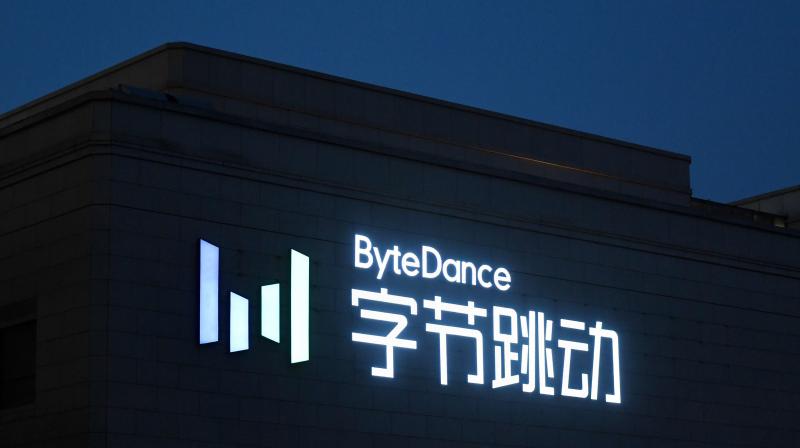 Washington: TikTok won a last-minute reprieve late Sunday as a US federal judge halted enforcement of a politically charged ban ordered by the Trump administration on downloads of the popular video app, hours before it was set to take effect.
Washington: TikTok won a last-minute reprieve late Sunday as a US federal judge halted enforcement of a politically charged ban ordered by the Trump administration on downloads of the popular video app, hours before it was set to take effect.
District Judge Carl Nichols issued a temporary injunction at the request of TikTok, which the White House has called a national security threat stemming from its Chinese parent firm’s links to the Beijing government.
The opinion was sealed, so no reason for the decision was released in a brief order by the court in Washington. The judge may unseal portions of the order after consulting with lawyers from both sides.
The Trump administration order had sought to ban new downloads of the app from midnight (0400 GMT Monday) but would allow use of TikTok until November 12, when all usage would be blocked. The judge denied TikTok’s request to suspend the November 12 ban.
The decision represents a temporary win for TikTok, which has 100 million US users. But the court has yet to consider the merits of the legal arguments on whether the social platform should remain available to Americans.
In arguments to Judge Nichols, TikTok lawyer John Hall said that TikTok is more than an app, since it functions as a “modern day version of a town square.”
“If that prohibition goes into effect at midnight, the consequences immediately are grave,’” Hall said. “It would be no different than the government locking the doors to a public forum, roping off that town square” at a time when a free exchange of ideas is necessary heading into a polarised election.
TikTok lawyers also argued that a ban on the app would affect the ability of tens of thousands of potential viewers and content creators to express themselves every month and would also hurt its ability to hire new talent. In addition, Hall argued that a ban would prevent existing users from automatically receiving security updates, eroding national security.
Justice Department lawyer Daniel Schwei said that Chinese companies are not purely private and are subject to intrusive laws compelling their cooperation with intelligence agencies. The Justice Department has also argued that economic regulations of this nature generally are not subject to First Amendment scrutiny.
“This is the most immediate national security threat,” argued Schwei. “It is a threat today. It is a risk today and therefore it deserves to be addressed today even while other things are ongoing and playing out.”
Schwei also argued that TikTok lawyers failed to prove the company would suffer irreparable business harm.
The Justice Department laid out its objections to TikTok’s motion for a temporary injunction in a brief under seal, but it was unsealed in redacted form to protect confidential business information.
The company’s lawyers also argued that the ban was unnecessary because negotiations were already underway to restructure the ownership of TikTok to address national security issues raised by the administration.
Trump has given tentative approval to a proposed deal in which Oracle and Walmart could initially own a combined 20% of a new US entity, TikTok Global. But Trump also said he could retract his approval if Oracle doesn’t have “total control” of the company.
The deal remains unfinalised, and the two sides have also appeared at odds over the corporate structure of TikTok Global. ByteDance said last week that it will still own 80% of the US entity after a financing round. Oracle, meanwhile, put out a statement saying that Americans “will be the majority and ByteDance will have no ownership in TikTok Global.”
Government-owned media in China have criticised the deal as bullying and extortion. ByteDance said Thursday it has applied for a Chinese technology export license after Beijing tightened control over exports last month in an effort to gain leverage over Washington’s attempt to force an outright sale of TikTok to US owners.
TikTok is also asking a federal court to declare Trump’s August 6 executive order unlawful.
The Chinese firm said the president doesn’t have the authority to take these actions under the national security law he cited; that the ban violates TikTok’s First Amendment speech rights and Fifth Amendment due-process rights; and that there’s no authority for the restrictions because they are not based on a national emergency.
Government lawyers argued the president has a right to take national security actions, and said the ban was needed because of TikTok’s links to the Chinese government through its parent firm ByteDance.
A government brief called ByteDance “a mouthpiece” for the Chinese Communist Party and said it was “committed to promoting the CCP’s agenda and messaging.”
After the judge’s order, the Commerce Department said in a statement it would comply with the injunction but “intends to vigorously defend the (executive order)… from legal challenges.”
University of Richmond law school professor Carl Tobias called Sunday’s order “a pragmatic splitting of the baby for the short term, to give a little time for them to resolve the disputes and come to a resolution.”
Tobias said an appeal is possible but that the legal teams may choose to “try to work out a resolution to the broader legal clash” with the judge.
Implications for internet
An amicus brief filed by Netchoice, a trade group which includes Google, Facebook and Twitter, said a ban could have important implications for the global internet.
“The government’s actions are unprecedented in scope,” the group said in its filing.
A ban would “also create a dangerous precedent” for the open internet, the brief said.
“The prohibition on any use of TikTok code by US developers for any purpose is effectively a ban on the building blocks of digital free expression.”
The trade group said a TikTok ban may be cited by China or other countries “as justification for banning or restricting the activities of US internet businesses, including US-based social media platforms.”
Earlier this month, Trump cited national security concerns and issued orders to ban both TikTok and the popular Chinese app WeChat, which has been put on hold in a separate court case in California.
But the TikTok order stops short of a full ban until November 12, giving parent firm ByteDance time to conclude a deal to transfer ownership of the app.

























